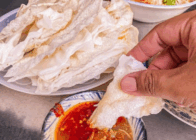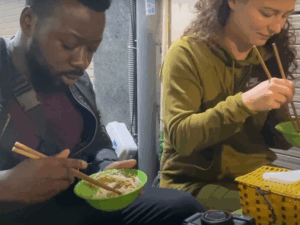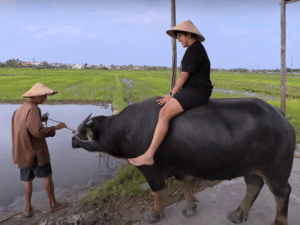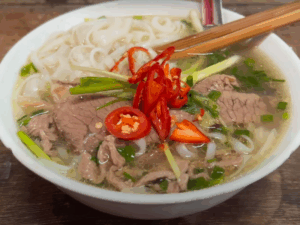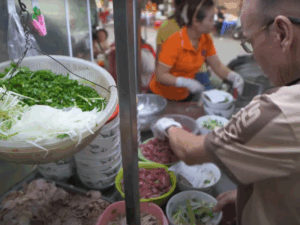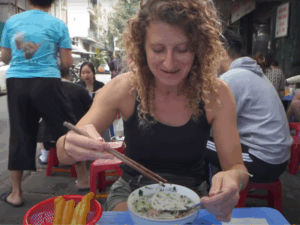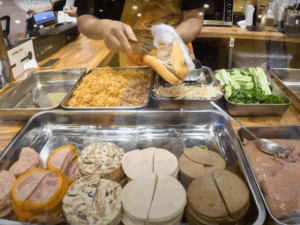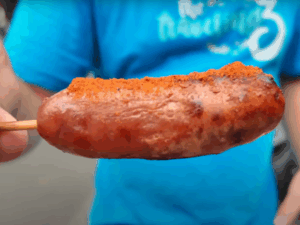The Historical and Cultural Significance of Vietnamese Dishes
Vietnamese cuisine is deeply rooted in the country’s agricultural history, with rice being a staple ingredient that has sustained communities for centuries. The importance of communal dining and local ingredients is evident in every meal, reflecting the Vietnamese philosophy of balance and harmony in life.
Specific dishes hold cultural significance, often tied to family traditions and community celebrations. For example, “Pho,” the iconic Vietnamese noodle soup, is more than just a comfort food; it represents the Vietnamese spirit of resilience and adaptation, having been influenced by both Chinese and French culinary techniques.
Historical influences have also shaped Vietnamese cuisine. The Chinese introduced noodles and stir-frying, while the French brought baguettes and coffee. These influences have been seamlessly integrated into Vietnamese food, creating a unique fusion that continues to evolve.
Must-Try Vietnamese Dishes and Their Regional Variations
Pho
Pho is a fragrant noodle soup that varies regionally. In Northern Vietnam, you’ll find a simpler version with a clear broth, while Southern variations are richer and more complex, often served with an array of herbs and condiments.
Banh Mi
This Vietnamese sandwich, born from French colonial influence, combines a crispy baguette with savory fillings like grilled pork, pate, and pickled vegetables. Each region adds its twist, making every Banh Mi a new experience.
Spring Rolls
Whether fresh (Goi Cuon) or fried (Cha Gio), Vietnamese spring rolls are a must-try. Fresh spring rolls are light and healthy, filled with shrimp, pork, and herbs, while fried ones offer a crispy, savory delight.
Ingredients Key to Vietnamese Cooking
Fish Sauce
Fish sauce (Nuoc Mam) is a staple in Vietnamese kitchens. Its umami flavor enhances everything from soups to dipping sauces.
Herbs
Fresh herbs like mint, cilantro, and Thai basil are essential for balancing the flavors in Vietnamese dishes. They add freshness and complexity to every bite.
Rice
Rice is the backbone of Vietnamese cuisine, used in various forms such as rice noodles, sticky rice, and rice paper for spring rolls.
Famous Street Food in Vietnam
Bun Cha
This Hanoi specialty features grilled pork patties served with vermicelli noodles, fresh herbs, and a tangy dipping sauce. It’s a favorite among locals and tourists alike.
Banh Xeo
These savory pancakes are filled with shrimp, pork, and bean sprouts, then wrapped in lettuce and herbs. They’re crispy, flavorful, and utterly addictive.
Cao Lau
A dish unique to Hoi An, Cao Lau combines chewy noodles with slices of pork, fresh greens, and crispy croutons, all served in a savory broth.
Best Places to Experience Authentic Vietnamese Cuisine
Hanoi
The capital city is a food lover’s paradise, with street vendors offering everything from Pho to Bun Cha. Don’t miss the chance to explore the Old Quarter’s bustling food scene.
Ho Chi Minh City
This vibrant metropolis is a melting pot of flavors, offering both traditional dishes and modern culinary innovations. Be sure to visit Ben Thanh Market for an authentic taste of the city.
Hoi An
Known for its well-preserved architecture and delicious food, Hoi An is the place to try unique dishes like Cao Lau and White Rose dumplings.
Vietnamese Cuisine’s Global Influence
Vietnamese cuisine has made a significant impact on the global culinary scene. Renowned chefs like Anthony Bourdain and Gordon Ramsay have praised its complexity and depth of flavor. Restaurants worldwide now feature Vietnamese dishes, and cooking shows and blogs are dedicated to teaching people how to recreate these dishes at home.
How to Cook Vietnamese Dishes at Home
Gather Essential Ingredients
Start with basics like fish sauce, rice noodles, and fresh herbs. These are the building blocks for many Vietnamese recipes.
Follow Authentic Recipes
Look for recipes that offer step-by-step instructions and authentic tips. Websites like “Vietnamese Cooking” and “Indochine Recipes” are great resources.
Experiment and Adapt
Don’t be afraid to experiment with flavors and ingredients. Vietnamese cuisine is all about balance, so play around until you find what works for you.
Engage Your Senses
Cooking Vietnamese dishes isn’t just about following a recipe—it’s an adventure for your senses. The vibrant colors of fresh herbs and vegetables, the sizzling sounds of ingredients hitting a hot pan, and the intoxicating aromas wafting through your kitchen all come together to create an immersive culinary experience. Feel the textures as you chop, stir, and taste to make sure your dish is just right.
Share the Experience
One of the greatest joys of cooking is sharing your creations with others. Invite friends and family over for a Vietnamese-themed dinner party. Set the scene with traditional music and decorations, and encourage your guests to get involved in the cooking process. Sharing not only the food but also the stories behind each dish can make the meal even more memorable.
Continual Exploration
Vietnamese cuisine is incredibly diverse, and there’s always something new to discover. Whether it’s a lesser-known regional specialty or a modern twist on a classic dish, the possibilities are endless. Join Vietnamese cooking classes, watch culinary travel shows, or even plan a trip to Vietnam to deepen your connection to this rich and vibrant cuisine.
Keep exploring, keep experimenting, and most importantly, keep having fun in your culinary journey.
Conclusion
Vietnamese cuisine is more than just food; it’s an experience that connects you to a rich cultural heritage. From the historical significance of dishes to the vibrant street food culture, every bite tells a story. Whether you’re planning a trip to Vietnam or trying to recreate these flavors at home, the culinary adventures await.
Plan your culinary adventure in Vietnam today and immerse yourself in the flavors and stories of this incredible cuisine.
- Uncover Cambodia’s Hidden Charms 6 Days / 5 Nights (177 views)
- The Best Exotic Vietnam – 16 Days / 15 Nights (118 views)
- The 10 Best Tour Operators in Vietnam for 2025: An Expert, Objective Review (99 views)
- Discover the Enchanting Culture of Hanoi in Every Sense (80 views)
- Seamless Cruise: Halong Bay to Da Nang – Fostering smooth travel experience from Halong Bay to Da Nang. (80 views)




